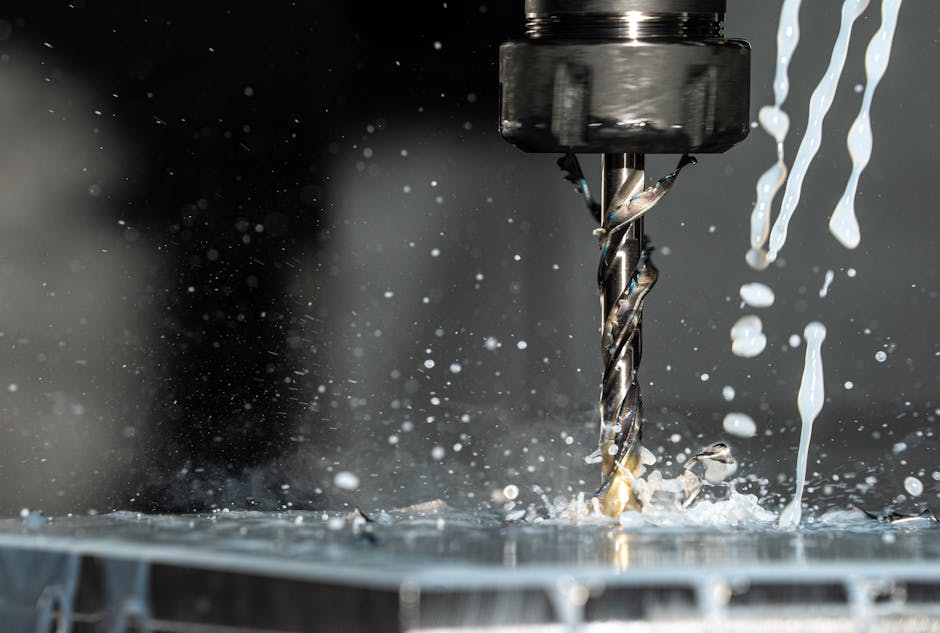Exploring the Evolution of CNC Machining in the UK Manufacturing Industry
The evolution of CNC (Computer Numerical Control) machining within the UK manufacturing industry has been a pivotal force in shaping the modern landscape of production and innovation.
This exploration delves into the chronological progression from the traditional methods of manual machining to the widespread integration of CNC technology.
It illuminates the transformative impact of CNC on productivity, precision, and the overall manufacturing process.
Furthermore, the narrative encompasses the continuous innovations and advancements in CNC machining that have propelled the UK manufacturing sector forward.
By scrutinising this evolution, we gain an understanding of the profound influence that CNC machining has had on the UK’s industrial prowess and its position in the global manufacturing arena.
Key Takeaways
- Highly skilled craftsmen initially used basic tools, but the introduction of CNC technology revolutionised the manufacturing industry in the UK.
- The transition from manual machining to CNC technology posed challenges, but specialised training programmes played a pivotal role in facilitating the shift.
- CNC technology significantly enhanced productivity, precision, and automation in manufacturing processes.
- Innovations in CNC machining, such as high-speed machining and 5-axis machining, further improved efficiency and allowed UK manufacturers to stay competitive in the industry.
The Early Days of Manual Machining

The development of manual machining in the UK manufacturing industry laid the foundation for the evolution of modern CNC technology. In the early days, manual machining involved highly skilled craftsmen using basic tools such as lathes, milling machines, and grinders to shape raw materials into precision components. These early techniques relied heavily on the keen eye, steady hand, and expert craftsmanship of the machinists. The evolution of manual machining over time saw the refinement of these techniques, resulting in more intricate and precise metalwork.
Craftsmanship evolution in manual machining was marked by the introduction of innovative tools and processes, such as the invention of the lathe in the 13th century and the development of screw-cutting lathes in the 1700s. These advancements not only improved the efficiency of manual machining but also elevated the quality and precision of the finished products. The demand for more complex components further fuelled the need for advancements in craftsmanship, leading to the gradual integration of automated processes and the eventual emergence of CNC technology.
Transition to CNC Technology

How did the introduction of CNC technology revolutionise machining processes in the UK manufacturing industry?
The transition to CNC technology has brought about significant changes in the way machining is carried out, introducing a more precise and efficient method. However, this transition has not been without its challenges.
-
Initial Resistance: Many skilled machinists initially resisted the shift to CNC technology, fearing that their expertise in manual machining would become obsolete.
-
Transition Challenges: Adapting to the new technology posed various challenges, including the need for retraining and the potential for errors during the transition phase.
-
Training Programmes: To address the transition challenges, specialised training programmes were developed to equip machinists with the necessary skills to operate CNC machines effectively.
-
Skill Upgradation: The introduction of CNC technology necessitated the need for upgradation of skills, requiring machinists to embrace a new way of working while leveraging their existing expertise.
To facilitate a smooth transition to CNC technology, the implementation of comprehensive training programmes played a pivotal role in ensuring that machinists were equipped with the knowledge and skills required to operate CNC machines proficiently.
Impact on Productivity and Precision

The introduction of CNC technology in the UK manufacturing industry has significantly enhanced productivity and precision in machining processes. Productivity improvements are evident due to reduced setup times, improved tool utilisation, and faster cutting speeds. CNC machining has streamlined operations by allowing for continuous production runs with minimal downtime between tasks, thereby maximising overall output. Additionally, the automation of processes has led to a reduction in manual labour, freeing up skilled workers to focus on higher-value tasks, further contributing to increased productivity.
CNC precision advancements have revolutionised the manufacturing industry by enabling the production of highly intricate and complex components with unprecedented accuracy. The ability to programme the exact specifications into the CNC system ensures consistent and precise output, minimising errors and material wastage. Moreover, the integration of advanced software and technology has facilitated real-time monitoring and quality control, resulting in superior precision and adherence to tight tolerances.
Innovations in CNC Machining

Advancements in CNC machining technology have revolutionised the manufacturing processes in the UK, driving innovation and efficiency. The integration of cutting-edge technologies has led to significant improvements in CNC machining, shaping the landscape of the manufacturing industry.
Key innovations currently impacting CNC machining in the UK include:
-
High-Speed Machining: Utilising advanced tooling and high spindle speeds to achieve increased productivity and reduced lead times.
-
5-Axis Machining: Allowing for the production of intricate and complex geometries with higher accuracy and fewer setups, enhancing overall manufacturing capabilities.
-
IoT and Data Analytics: Integration of IoT devices and data analytics software to monitor machine performance, predict maintenance needs, and optimise production processes.
-
Additive Manufacturing Integration: Incorporating additive manufacturing processes alongside traditional subtractive methods to provide greater design freedom and cost-effective production of complex parts.
These advancements have not only propelled the manufacturing industry towards unparallelled precision and productivity but have also paved the way for new opportunities and business growth.
The continuous evolution of CNC machining technologies underscores the industry’s commitment to embracing innovation and pushing the boundaries of what is achievable.
Shaping the UK Manufacturing Landscape

Influencing the trajectory of the UK manufacturing landscape, CNC machining technologies continue to drive unprecedented innovation and efficiency, revolutionising the industry. The adoption of advanced CNC machining technology has enabled UK manufacturers to stay competitive in the global market by enhancing productivity, precision, and flexibility. Embracing these technologies has allowed UK manufacturers to respond effectively to the demands of global competition, ensuring the production of high-quality components and products. Furthermore, the integration of CNC machining has facilitated the streamlining of manufacturing processes, leading to reduced lead times and costs, ultimately enhancing the overall competitiveness of the UK manufacturing sector.
| Key Benefits of CNC Machining Technology |
|---|
| Enhanced Productivity |
| Improved Precision |
| Increased Flexibility |
The continuous advancement in CNC machining technology has significantly shaped the UK manufacturing landscape, allowing companies to adapt to the rapidly changing global market dynamics. As technology adoption becomes increasingly crucial for the UK manufacturing industry to thrive in the face of global competition, the strategic implementation of CNC machining technologies is vital for sustaining and enhancing the country’s manufacturing capabilities.
Frequently Asked Questions
What Are the Specific Challenges Faced by UK Manufacturers When Transitioning From Manual Machining to CNC Technology?
Transitioning from manual machining to CNC technology presents challenges for UK manufacturers, including the need for comprehensive training to adapt to the new technology. Meeting these training needs is crucial for a successful transition.
How Has the Evolution of CNC Machining Impacted the Skill Sets Required for Workers in the UK Manufacturing Industry?
The evolution of CNC machining has transformed the skill sets required for workers in the UK manufacturing industry, necessitating advanced training in computer programing, automation, and precision engineering. This impact underscores the need for ongoing workforce development initiatives.
What Are Some Examples of Groundbreaking Innovations in CNC Machining That Have Originated From the Uk?
In the UK, innovative applications and revolutionary techniques in CNC machining have led to groundbreaking innovations. Examples include advancements in multi-axis machining, high-speed cutting, and adaptive control systems, showcasing the nation’s prowess in pushing the boundaries of manufacturing technology.
How Has the Adoption of CNC Technology in the UK Manufacturing Industry Affected the Global Competitiveness of UK-Made Products?
The adoption of CNC technology in the UK manufacturing industry has significantly impacted the global competitiveness of UK-made products. This technological advancement has led to increased efficiency, precision, and production capabilities, thereby positively influencing the economic implications of the country’s manufacturing sector.
What Are Some Potential Future Developments in CNC Machining That Could Further Shape the Landscape of the UK Manufacturing Industry?
Potential innovations in CNC machining, such as advanced automation integration, are poised to revolutionise the UK manufacturing industry. These developments could significantly impact productivity by streamlining processes and reducing costs, ultimately enhancing the sector’s competitiveness.
Conclusion
In conclusion, the evolution of CNC machining in the UK manufacturing industry has significantly improved productivity and precision.
The transition from manual machining to CNC technology has revolutionised the manufacturing landscape, leading to innovations in the industry.
With the continuous advancements in CNC machining, the future holds even greater potential for growth and improvement in the manufacturing sector.
Contact us to discuss our services now!
